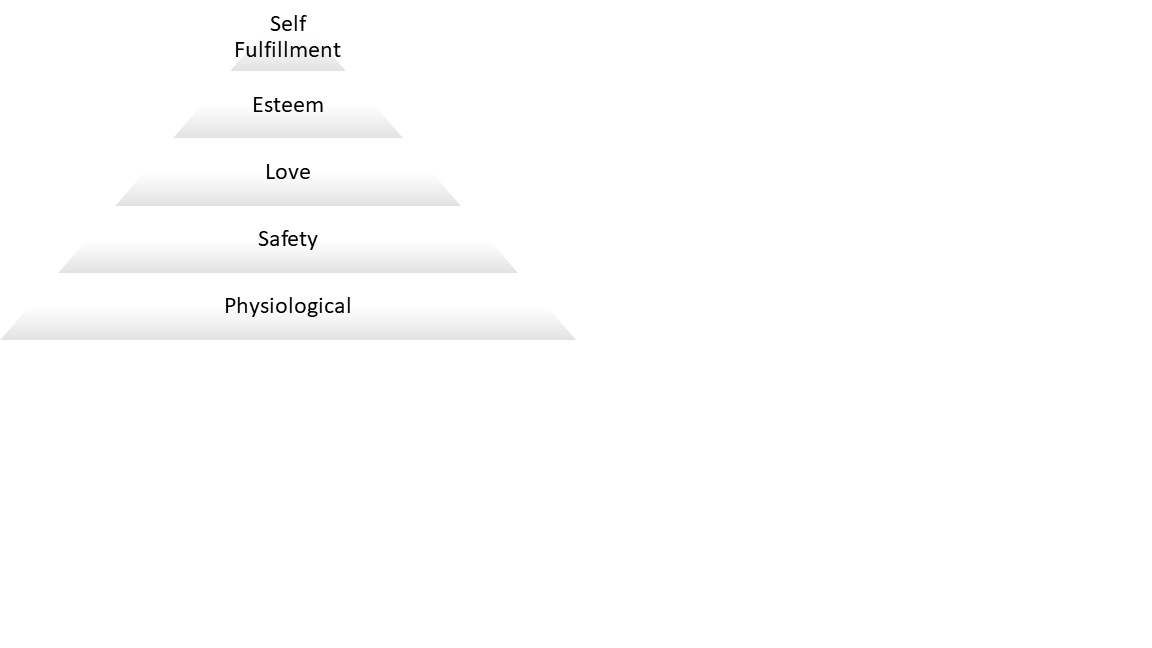Maslow’s Hierarchy of Needs is a well-established concept in psychology. As illustrated in Figure 1.1 below, Maslow’s Hierarchy of Needs has five levels of human needs, and in it, Maslow stated that these are the broad categories under which human needs fall, and that humans will always be in pursuit of one level or the other from them.
Moreover, he also stated that without fulfilling the base, humans will not be able to proceed to the next level, for example, without achieving their own safety, humans will not proceed to the pursuit of love.
The five levels are physiological needs, such as sustenance and shelter, followed by physical safety, with the third level of love being represented by friendships and relationships, and after that being established, moving on to esteem where one would pursue accomplishments and prestige as defined by society, and finally, self-actualizations, where individuals achieve their full potential and pursue accomplishments and obtain prestige by their own personal definition.

This model has been used in psychology, sociology, human resources, and business management studies amongst industries and fields. In Business Administration degrees, it is included in just about every level of studies from bachelors, throughout to masters, and reaching till doctorates.
The concept is accepted in the management field as a tool for Human Resources Management in order to enable them to better understand their employees and manage their motivation to work and their job satisfaction.
The company in itself is considered an individual as well though, with its own legal standing, so it stands to reason that the company too has its own set of needs.
When speaking of the needs of a company, what is referred to is what the company needs in order to operate successfully and not only survive but also thrive. While the traditional Maslow’s Hierarchy of Needs might be a robust idea for individuals, it cannot be directly translated into the Business Hierarchy of Needs, but it can be used as a foundation for it.

The figure 1.2 above shows the different needs of the company as an entity, with further details on each level available below.
- Ketzenjammer: All businesses need a problem on which to lay their foundation. At their core, businesses came about because individuals with unique insight recognized a new innovative way to come up with a solution for a problem that was already existing. Even for already existing companies, as they are always striving in order to invent new solutions for their existing problems, or to locate new problems in order to solve with their existing solution in order to grow. One can say that a world without problems is a world without business.
- Heart: The driving force behind any individual is their heart, and similarly, the driving force behind the business is its heart. The heart of the business being composed of its Mission, Vision, Purpose, & Values. With these corner stones, the business would be ready to tackle its Katzenjammer, the problem it has identified, with its Mission referencing how they want to tackle the problem, their vision describing their future of the world with their solution to the problem, their purpose stating why they think their problem is an important one to solve, and finally their values in order to identify how they relate to the problem and what they would do in order to solve it.
- Artifacts: The products or services of the companies. This is how the company will generate its revenue and its profits. The proposed solution needs to be able to be packaged into a product or a service that the business can commercialize and convince people of its utility in order to purchase it. If the Katzenjammer is the foundation of the business, and the Heart is the corner stones of it, then the Artifacts are the building blocks that will come together to raise the building of the business.
- Yakka: Meaning Hard Work! Plain and simple, once the foundations are established, and once the corner stones are set and the building blocks of the business are defined, then it would be time for Yakka or hard work. Putting it all together and creating tangible value from the combination of the problem, the entity, and the solution are an unavoidable process of gritty hard work. This is the magical link where most businesses fail.
- Awareness: Market awareness, creating a brand which people will recognize and trust is an essential part of creating a long lasting piece that will generate value and create probability in its domain. While it is true that by pure definition and arithmetic marketing is a cost center; however, is it a cost center which will elevate the revenue centers. Amazingly prepared meals will often easily be overlooked without the appropriate presentation, and similarly, once you have Yakka’d your business from the Katzenjammer, the heart, and the Artifacts, awareness is the beautiful decorations on the outside of the building that will invite potential customers in.
- Liquidity: Finally, liquidity, the silent killer and a cancer for businesses, existing or new, liquidity issues are the most common reason for a business downfall, with many businesses being profitable on their financial statements, and rightfully so, but simply unable to manage their bills, collection, and their credit terms. Many businesses focus too much on their operational or technical aspect, and start ignoring the governance or management of the firm, falling into a liquidity trap which is challenging to recover from. Liquidity is the item that keeps the building standing and keeps its utilities running.
The above elements are all needs of a business that is being established, as well as a need for existing businesses, which are difficult to exist without, with each element being a building block that is essential for the other elements to come together and form or reform a successful and healthy business entity.

